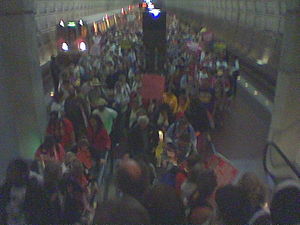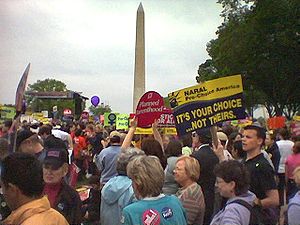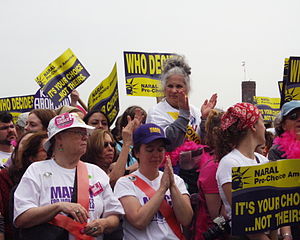- March for Women's Lives
-
 Participants leaving the Washington Metro at Stadium-Armory after the march
Participants leaving the Washington Metro at Stadium-Armory after the march
The March for Women's Lives was a demonstration for reproductive rights and women's rights, held April 25, 2004 on the National Mall in Washington, D.C.. The National Park Service no longer makes official estimates of attendance after the Million Man March controversy in 1994, so official estimates are often speculation. March organizers estimated that 1.15 million people participated, declaring it "the largest protest in U.S. history";[1] others estimated no more than 800,000 marchers,[2] with the Associated Press and the BBC putting the figure between 500,000 and 800,000, comparable to the Million Man March of 1995.[3] Major themes included "anger at the anti-woman policies imposed by President Bush including the passage of the Partial-Birth Abortion Ban Act in 2003[4] and the urgency of a presidential election season. Pro-Life protesters were present in some places along the march route. There were no violent incidents,[5] despite the Washington Post's Hank Steuver referring to it as "aggressive and even occasionally, almost delightfully, profane."[6]
Contents
Events and participants
A rally on the Mall began at 10 a.m., and was followed by a march through downtown Washington, with a route along Pennsylvania Avenue. Notable celebrities who appeared at the march included Peter, Paul and Mary, Indigo Girls, Moby, Ani DiFranco, Susan Sarandon, Whoopi Goldberg, Ashley Judd, Kathleen Turner, Ted Turner, Ana Gasteyer, Janeane Garofalo, Bonnie Franklin, Holly Near, Cris Williamson, Julianne Moore and former Secretary of State Madeleine Albright; also appearing were veteran abortion rights leaders, such as Kate Michelman of NARAL Pro-Choice America and Gloria Steinem, and many members of Congress. Sponsoring organizations included NARAL Pro-Choice America, Choice USA, the Feminist Majority Foundation, Planned Parenthood, the American Civil Liberties Union, the National Association for the Advancement of Colored People (NAACP), the National Organization for Women, the National Latina Institute for Reproductive Health, Code Pink, and Black Women's Health Imperative.
Pro-life counter-protesters, some affiliated with Randall Terry's "Operation Witness", lined a portion of the march route along Pennsylvania Avenue.[5] Terry estimated that there were "over a thousand" counter-protesters;[7] pro-choice writer Jo Freeman estimated that there were "about 300",[5] and the Washington Post wrote that there were "scores".[8] Sixteen protesters from the Christian Defense Coalition were arrested for demonstrating without a permit when they crossed police barricades into the area designated for the March.[8]
See also
References
- ^ http://www.now.org/history/protests.html
- ^ [1] Washington Post
- ^ "Abortion activists on the march". BBC News. BBC. 26 April 2004. http://news.bbc.co.uk/2/hi/americas/3657527.stm. Retrieved 8 June 2009.
- ^ [2] NOW.org
- ^ a b c "The March for Women's Lives, April 2004". Jofreeman.com. 2004-04-25. http://www.jofreeman.com/photos/MFWL.html. Retrieved 2009-07-16.
- ^ [3] Hank Stuever, Washington Post, April 26, 2004, via George.Loper.Org.
- ^ "family planning capitalism vitamins for at". Societyfortruthandjustice.com. http://www.societyfortruthandjustice.com/operation_witness.htm. Retrieved 2009-07-16.[dead link]
- ^ a b Williamson, Elizabeth (2004-04-25). "Abortion Rights Advocates Flood D.C. (washingtonpost.com)". washingtonpost.com. http://www.washingtonpost.com/ac2/wp-dyn/A41023-2004Apr25. Retrieved 2009-07-16.
External links
- Jo Freeman: March for Women's Lives (text and photos)
- "Pro-Choice March Largest in History", Women's eNews, April 25, 2004
- Choice USA Photo gallery (photos)
- Washington Post, April 25, 2004: Abortion Rights Advocates Flood DC
- NOW: Why You Should March
- LifeNews: Catholic Group Leaves Anti-War Coalition Over Pro-Abortion March
- NOW History of Marches and Mass Actions
- NOW March for Women's Lives gallery (text and photos)
Categories:- 2004 in Washington, D.C.
- Pro-choice movement
- Protest marches in Washington, D.C.
- History of women's rights in the United States
- Feminism and health
- Feminist protests
Wikimedia Foundation. 2010.


